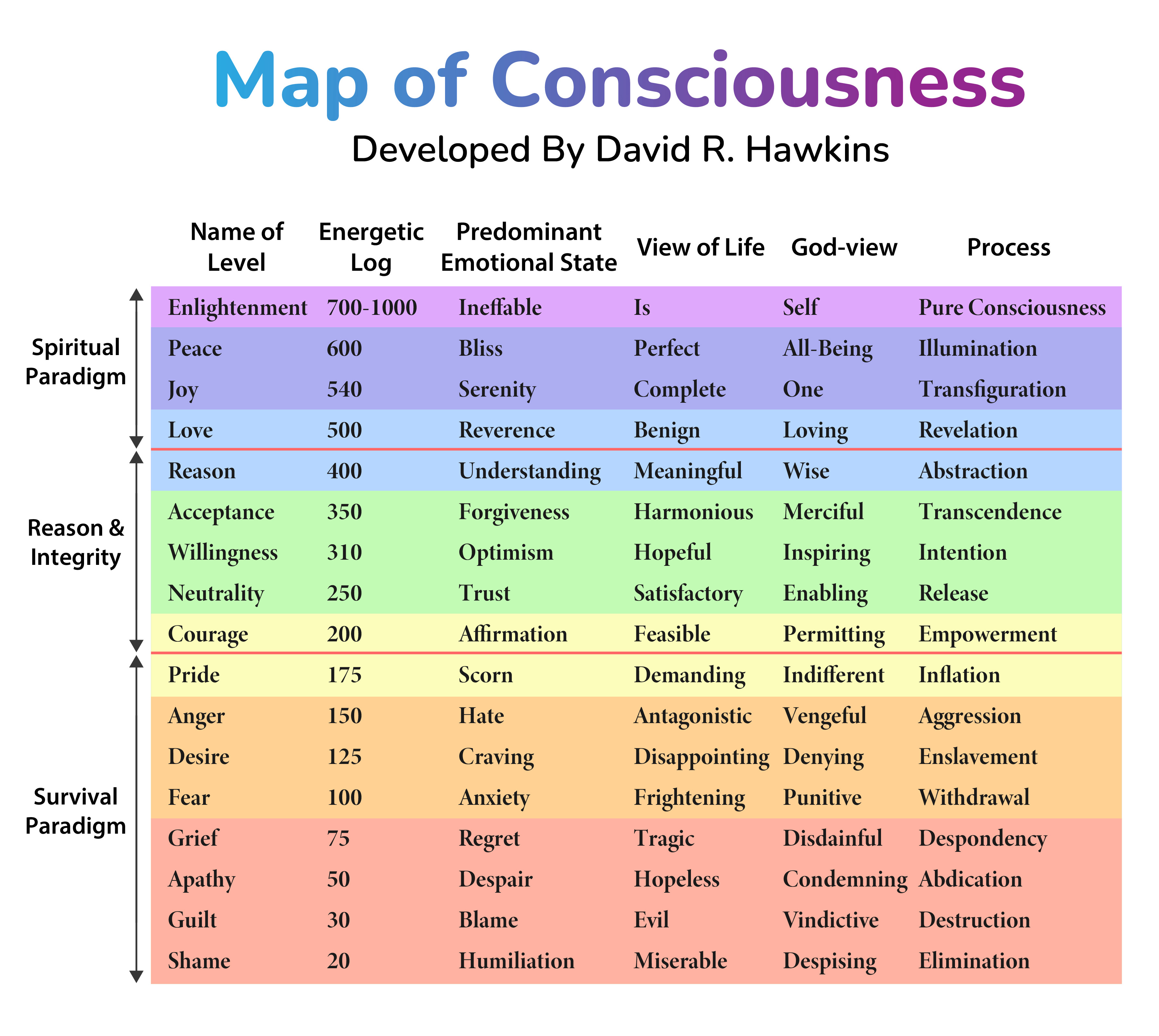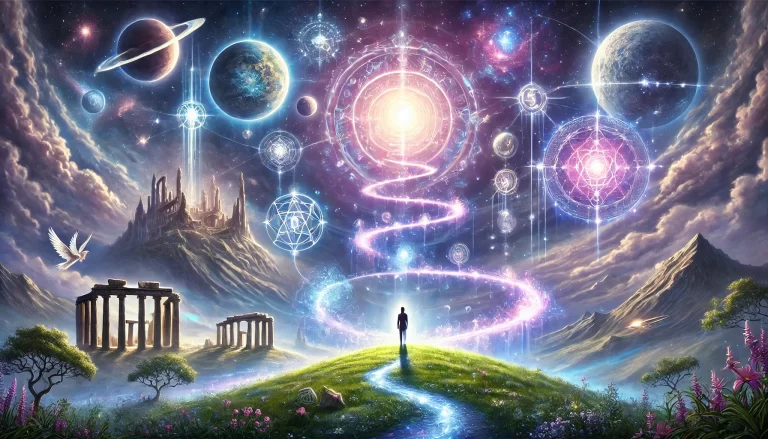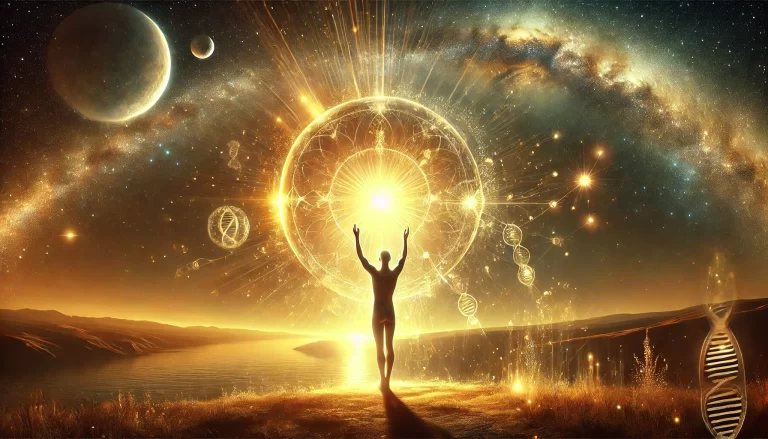Understanding Depression from a Spiritual Perspective: A Path to Healing
Depression is often described as a heavy cloud that darkens your entire world, leaving you feeling isolated, hopeless, and disconnected. For many, traditional therapy and medications have been the go-to solutions for managing depression. While these methods can be effective for some, there’s growing interest in exploring a more holistic, spiritual perspective on depression. What if depression isn’t just a clinical condition, but a deeper call for change, growth, or awakening on a spiritual level?

In this article, we’ll explore depression through the lens of spirituality, particularly drawing from the teachings of Dr. David R. Hawkins’ Map of Consciousness. We’ll also discuss whether therapy and medication truly help and introduce meditation as a tool for healing and preventing depression.
Depression and the Levels of Consciousness
Dr. David R. Hawkins, a renowned psychiatrist and spiritual teacher, developed a framework known as the Map of Consciousness. In this model, human consciousness is ranked on a scale from 0 to 1,000, where each level corresponds to a different emotional state or level of awareness. The lower levels are associated with negative emotions such as shame, guilt, fear, and depression, while the higher levels correspond to states of love, peace, joy, and enlightenment.
Depression, from this perspective, is situated at the lower levels of consciousness, particularly around the level of Apathy (calibrated at 50) and Grief (calibrated at 75). These levels are characterized by feelings of hopelessness, lack of energy, and an inability to see a way out of current circumstances.

When a person is experiencing depression, they often feel trapped in these low-energy states. They may have a constant feeling of being “stuck” and disconnected from their true self or higher consciousness. From a spiritual perspective, this state of being is not just a mental health issue but a reflection of disconnection from our inner truth and higher purpose.
Therapy and Medication: Do They Help?
For many people, traditional therapy and antidepressant medications provide relief from the symptoms of depression. Therapy, particularly forms like Cognitive Behavioral Therapy (CBT), can help individuals reframe their thought patterns, allowing them to break out of the cycle of negative thinking that often fuels depression. Antidepressant medications, on the other hand, work by altering brain chemistry to lift the mood.
But while these methods can be effective in managing symptoms, they often treat the surface of the problem rather than addressing the underlying spiritual disconnection. Therapy and medication may help someone feel better temporarily, but the root cause of the depression—often a deeper emotional or spiritual issue—may still remain unresolved.
This isn’t to say that therapy and medication aren’t useful or necessary. In fact, for many people, they can be lifesaving tools that stabilize their mood and allow them to function. However, from a spiritual perspective, healing from depression requires going deeper. It calls for reconnecting with one’s higher self, addressing unresolved emotions, and finding a sense of purpose and meaning in life.
Depression as a Call for Spiritual Awakening
From a spiritual standpoint, depression can sometimes be seen as a “dark night of the soul”—a period of deep emotional suffering that ultimately serves as a catalyst for spiritual growth and transformation. The pain and emptiness felt during depression may be signaling that something in your life needs to change. This change could be as simple as letting go of limiting beliefs or as profound as rediscovering your life’s purpose.
Depression can be an invitation to explore parts of yourself that you’ve neglected or suppressed. It encourages you to turn inward, confront your shadows, and reconnect with your true essence. While this process can be difficult and painful, it can also be incredibly transformative.
Dr. Hawkins’ levels of consciousness offer a roadmap for moving out of depression and into higher states of awareness. By consciously working to raise your vibration and move up the scale—from apathy and grief to courage, acceptance, and eventually love—you can begin to experience healing on a deeper level.
Meditation as a Path to Healing
One powerful tool that can help in this process is meditation. Meditation is a practice that allows you to quiet the mind, tune into your inner self, and connect with the present moment. From a spiritual perspective, meditation is more than just a way to relax; it’s a way to raise your consciousness and align yourself with your higher self.
When you meditate, you create space between your thoughts and emotions, allowing you to observe them without getting caught up in them. This can be incredibly helpful for those suffering from depression, as it allows you to step back from the negative thoughts and emotions that often feel overwhelming.
Here are a few ways meditation can help with depression:
1. Breaking the Cycle of Negative Thinking
Depression often involves a cycle of negative thoughts that feed off each other, making it difficult to break free. Meditation helps you become more aware of these thought patterns and teaches you how to observe them without judgment. Over time, this can help you break the cycle of negativity and cultivate more positive, constructive thought patterns.
2. Connecting with Your True Self
Depression can make you feel disconnected from yourself and the world around you. Meditation helps you reconnect with your inner self—the part of you that is always at peace, regardless of external circumstances. This connection can provide a sense of grounding and stability, even in the midst of emotional turmoil.
3. Raising Your Vibration
As you meditate regularly, you begin to raise your vibration, moving up the levels of consciousness described by Dr. Hawkins. With consistent practice, you can move out of the lower states associated with depression and into higher states of awareness, where feelings of peace, joy, and love become more accessible.
A Simple Meditation for Depression
If you’re new to meditation or dealing with depression, start with a simple practice that focuses on the breath. Here’s a basic meditation you can try:
- Find a quiet, comfortable place where you can sit without distractions.
- Close your eyes and take a few deep breaths, allowing your body to relax.
- Bring your attention to your breath, focusing on the sensation of the air moving in and out of your body.
- If your mind starts to wander, gently bring your focus back to your breath.
- Continue this for 5 to 10 minutes, or longer if you feel comfortable.
Over time, as you build your meditation practice, you’ll likely notice shifts in your mood and perspective. The more you meditate, the more you align with your higher self, creating a sense of inner peace and resilience that can help protect against depression.
Finding Balance: Spirituality, Therapy, and Medication
It’s important to note that while meditation and spiritual practices can be incredibly healing, they’re not meant to replace traditional therapy or medication. For some, therapy and medication are essential tools for managing depression. The goal is to find a balance that works for you—whether that’s a combination of therapy, medication, and spiritual practices, or a different approach altogether.
Depression is a complex condition, and healing often requires addressing it from multiple angles—physical, emotional, mental, and spiritual. By incorporating meditation and other spiritual practices into your healing journey, you can tap into a deeper sense of peace and resilience, allowing you to move through depression and emerge stronger on the other side.
Energy Balancing for Deep Healing
In addition to meditation and spiritual practices, energy balancing can be a powerful tool for overcoming depression and restoring inner harmony. My husband, known as The Elder, offers personalized energy balancing sessions designed to realign your energetic system and release emotional blockages that may be contributing to feelings of depression or anxiety. Through his intuitive and experienced guidance, you can experience deep energetic shifts, helping you move toward a state of balance, peace, and clarity. Whether you’re feeling stuck or disconnected, these sessions offer a profound way to complement your spiritual healing journey.
If you’re interested in learning more or booking a session, feel free to reach out to us directly. We’d love to support you on your path to healing.
A Holistic Approach to Depression
Depression, from a spiritual perspective, is not just a condition to be “fixed” but a signal that something deeper is out of alignment. It’s an opportunity to reconnect with your true self and rediscover your purpose. While therapy and medication can be valuable tools, true healing often comes from within, through practices like meditation, self-reflection, and conscious living.
Have you experienced depression from a spiritual perspective? What practices have helped you find healing and peace? I’d love to hear your thoughts and experiences. Feel free to share in the comments or reach out to me directly.
Until next time, stay grounded and connected.
Anastasia Holistic Sage 🌿





